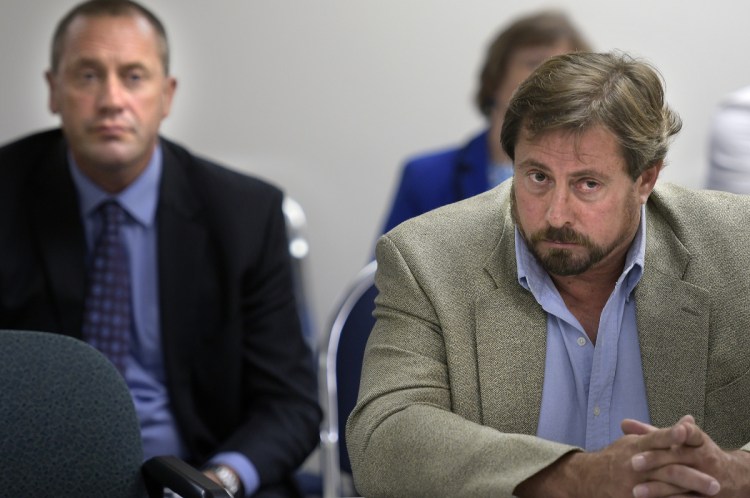WATERVILLE — The Republican nominee for House District 110 is planning to go forward with a mailer and an issues-based website at the same time a judge has ordered Gov. Paul LePage to release Clean Elections funding that has been denied to the nominee and other candidates.
Mark Andre, who won the Republican nomination for House 110 in a close recount, said he will proceed with a mailing outlining his plan to ask Colby and Thomas colleges to contribute toward reducing the town’s overall tax burden and a launch of a website outlining his plan.
“What we want to do is build political momentum,” he said.
Andre said the services were contracted before the recount, as he already had been declared the winner in a close primary; but his opponent, Jacob Imes, requested the recount. Results showed Andre won 210-203, or by more than 1 percent. The recount was voluntary on Imes’ part. Andre contests he should have been given the Clean Elections funding after he won the June 12 primary, which amounts to $5,075.
“The vendors have all agreed to wait for payment because of the situation that’s developed in Ethics,” he said.
Andre, whose case is peculiar because his funding was denied because of the late date of a recount, is one of about 130 candidates who are missing the funding they qualified for, because LePage refused to release $1.4 million in public funding for Clean Elections candidates, and Republican House members have refused to fix a typographical error in the law that provides additional Clean Election funds to be disbursed this year.
Another Republican House candidate, Kathy Javner, running for the House District 141 seat in parts of Penobscot and Washington counties, did not receive her $5,075. The ethics office made a mistake in not issuing her a check, as they assumed the close race eventually would lead to a recount.
A majority of the other candidates missing funding were Democrats or unenrolled, and the rest, other than Andre and Javner, were missing supplemental funding.
According to a news release from attorney John Brautigam, who brought the suit against LePage, the announcement from the court was a victory for Clean Elections candidates.
“The implications of this case go beyond Clean Elections, and touch on the power of the executive and rule of law,” he said.
Brautigam said in the release that over 175 candidates have been denied Clean Elections funding they qualified for.
“The governor does not have the freedom to ignore the will of the voters, or block funding for Clean Elections when the legislature has already appropriated the money. As Justice (William) Stokes concluded, the administration has an obligation to uphold the law and release the funds,” Brautigam said. “This is a victory for the voters, for democracy, and for the rule of law.”
Stokes said before issuing his decision that he expected it would be appealed to the Maine Supreme Judicial Court.
State Treasurer Terry Hayes, who is running for governor as an independent, is also a qualified Clean Elections candidate and is eligible for an additional $259,000 in funding.
The suit brought by Maine Citizens for Clean Elections against the governor was filed on behalf of those candidates and the Maine residents who made $5 donations to the candidates who qualified for Clean Election funding.
The Clean Election Act, established in 1996, is a voluntary program that fully finances qualified individuals running for governor or the Legislature. To qualify, candidates must collect a minimum number of donations of $5 or more made payable to the Maine Clean Election Fund. Once the candidate qualifies, he or she cannot accept private contributions.
Andre appeared on July 25 before the Ethics Commission to plead his case, namely that he is entitled to the funding because he had won his primary race, and the recount was voluntarily called by his opponent. He also said withholding the funding put him at a campaigning disadvantage, as his general election opponent, Colleen Madigan, was also a Clean Elections candidate and already has received initial funding.
The Ethics Commission stated at the July 25 meeting that it might call a special meeting, depending on what Stokes’ decision was.
Andre had said he may loan himself the $5,075 he qualified for to run his campaign, but he was advised against that by Jonathan Wayne, the executive director of the Commission on Governmental Ethics and Election Practices. Loaning money to himself would have been a violation, as technically it would have been a private donation, which Clean Elections candidates are not allowed to accept.
Wayne was out of his office and unavailable for comment.
Under Stokes’ order, LePage has three days to release the funding.
During the meeting with the Ethics Commission, Andre contested that he is entitled to the funding even though the recount occurred late, which he said was a result of the state being preoccupied with the first statewide ranked-choice voting efforts. Andre’s recount occurred near the end of June and the state wasn’t able to make a Clean Elections payment to his campaign before the new fiscal year began on July 1. The primary was June 12, but his recount wasn’t certified until July had already begun, and Andre said he wasn’t even notified until late June there was going to be a recount.
Wayne had said the Ethics Commission made every effort to make sure Andre, or Imes in the event the recount effort had determined he was the winner, could be paid. Andre had said previously he wanted the ability to loan himself the $5,075 in the meantime, but he said he was still deliberating that on Thursday.
According to a Portland Press Herald report, Stokes’ ruling does not affect an additional $4.8 million in clean elections funding that is tied up in a partisan dispute in the Maine House of Representatives.
Colin Ellis — 861-9253
cellis@centralmaine.com
Twitter: @colinoellis
Send questions/comments to the editors.



